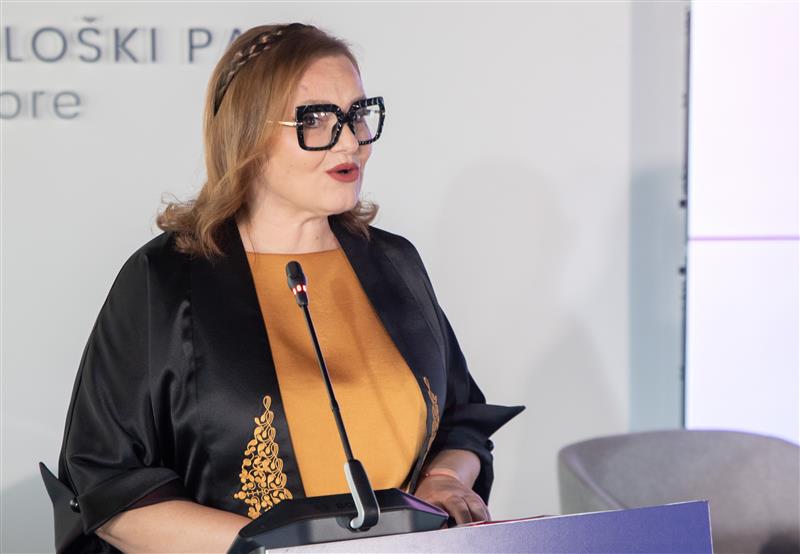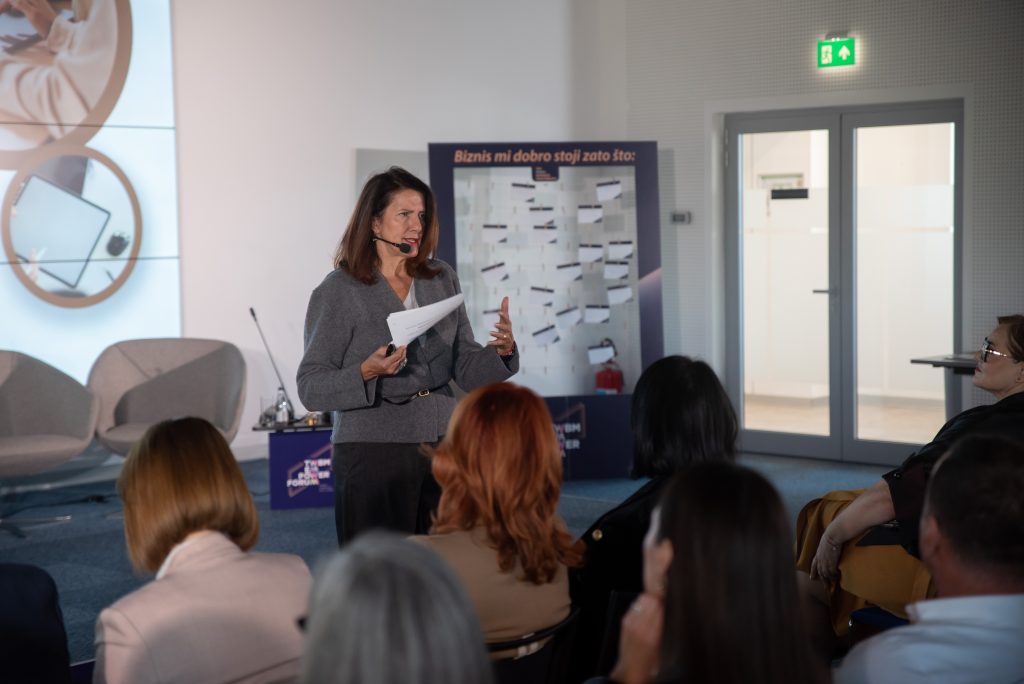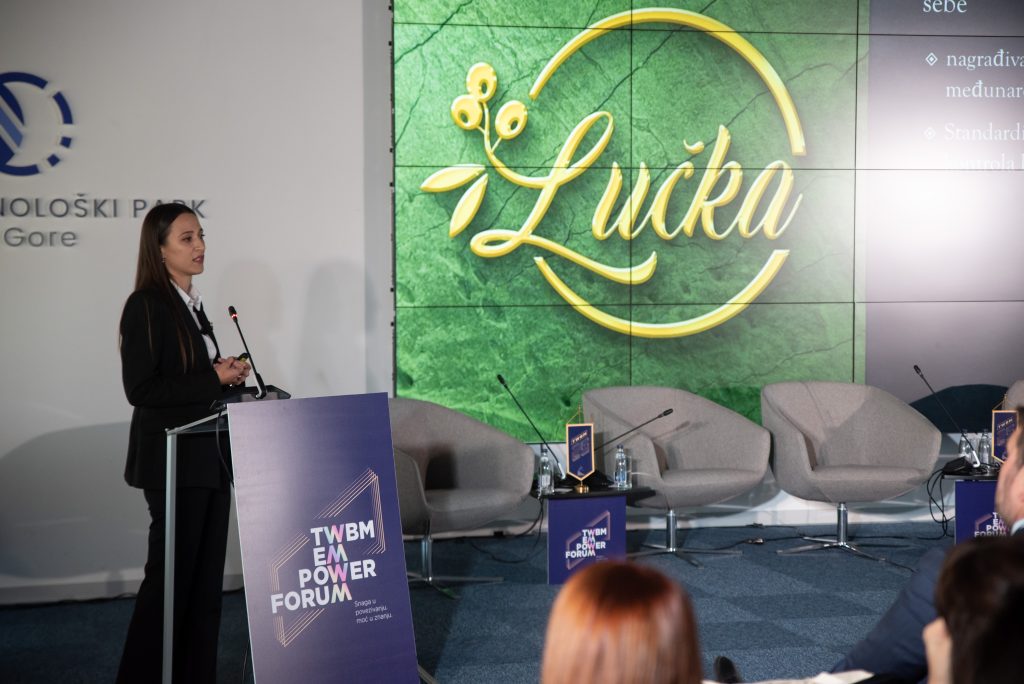The number of women-owned businesses is growing, but systemic barriers remain
At the Top Women Business Forum, results of the analysis on the state of women’s entrepreneurship, successful business stories, and key steps for overcoming obstacles were presented

The trend of growth in women-owned businesses in Montenegro continued during 2024. According to the latest analysis by the Top Women Business Montenegro initiative, presented in Podgorica at the Top Women Business Forum, women are owners or managers of 26.22 percent of the total number of companies in the country. Their companies generate 20.67 percent of Montenegro’s total revenue and employ 16.91 percent of the total number of employees. However, despite progress, systemic barriers, traditional stereotypes, and limited access to finance and strategic sectors still hinder their full development.

Opening the conference at the Science and Technology Park, founder of the Top Women Business Montenegro (TWBM) project and director of BI-communication, Ljiljana Burzan-Nikolić, said that the goal remains the same — to build a strong and sustainable platform for the affirmation and visibility of women’s business in Montenegro. “We are showing that the Top Women Business Montenegro initiative is growing, developing, and becoming richer year after year,” Burzan-Nikolić said.
Her optimism is supported by numbers that confirm what the idea of the project has been from the beginning — that women’s entrepreneurship in Montenegro is strengthening and becoming an important pillar of the national economy. This was confirmed by the newest analysis presented by Ratko Nikolić, chief analyst of the TWBM initiative and founder of BI Consulting, a business information provider. According to him, in 2024 an interesting shift occurred at the level of the entire economy — for the first time, a smaller number of financial reports was submitted.
“If we talk about the number of companies, in that part we see a sign of economic slowdown. However, that is not the case when it comes to women-owned businesses. Last year we saw a continuation of growth in women-owned companies, which means that among newly established companies, there are significantly more women-owned ones,” Nikolić said.
He added that there was faster growth in the number of businesses owned by women than those where women only manage companies, and that progress can also be seen in revenues and employment in companies led by women. “This means that every fourth company can be considered a women-owned company. They generate 20.67 percent of revenues in Montenegro and employ 16.91 percent of all employees in companies in the country,” Nikolić emphasized.

The panel dedicated to the analysis of the state of women’s entrepreneurship in Montenegro, which gathered representatives of institutions, international organizations, the banking and research sector, showed that despite the growth in women-owned businesses, systemic barriers still limit their full potential.
UNDP Gender Equality Team Leader Kaća Đuričković pointed out that the private sector in Montenegro is increasingly becoming a space where topics that should be led by institutions are being opened, yet the economy is still “blind to half of its human capital.” She warned that the system is full of “patches,” and that besides overlooking women, it often offers inappropriate business support.
“While we celebrate progress, I responsibly claim that money has not predominantly gone into the hands of women and women-owned businesses. Trends show that women ‘lift’ a business, fight their battles, but the system is set up so that large public procurements, through major interventions, go to companies owned by men, where capital overwhelmingly goes as ‘money to money’ within the male club. There is a strategy for women’s entrepreneurship, and then the system itself develops an ‘auto-immune mechanism’ to destroy the entire strategic process in the country. Only because the system is so patriarchally strong, deviations become normal,” Đuričković warned.
Denisa Šehović, Director of SME Business at NLB Bank, said that although there is growth in the number of women in leadership roles, they remain underrepresented in executive positions and boards of directors
“This means that women make up a significant part of the entrepreneurial community, but they are still insufficiently present in decision-making positions in medium and large companies,” Šehović stated. She explained that women more often come from sectors such as finance, education, and healthcare, while their presence is marginal in IT, construction, and energy — which indicates structural barriers and limited access to sectors with major growth potential.
“Women are highly educated, but there is a significant gap between education and positioning, and that must be a signal for action. We must work not only on developing competencies, but also on changing leadership culture and perception,” Šehović said.
From the government side, Anđela Gajević, Acting Director-General of the Directorate for Enhancing Economic Competitiveness at the Ministry of Economic Development, recalled that the development of women’s entrepreneurship is guided through the Strategy for the Development of Women’s Entrepreneurship and a number of specific programs. She announced that Montenegro will, starting next year, establish a Credit Guarantee Fund available to women, youth, and business beginners.
“This is an important mechanism that will facilitate access to finance,” Gajević stated, inviting commercial banks to take a more active role and jointly contribute to improving the business environment.
Representing the micro-finance sector, Snežana Božović from Alter Modus said that there is still much work ahead and that there is great space for progress in women’s entrepreneurship. She sees particular potential in agritourism — a field that combines tradition and entrepreneurship. In Montenegro there are around 27,000 agricultural holdings, and every eighth is run by a woman.
“Visibility and recognition of all forms of women’s entrepreneurship, as well as access to finance, are key challenges. For us, women’s entrepreneurship is not a question of equality, but of strength and the future,” Božović said.
Miljan Šestović, Director of the Sector for Research and Analysis at the Chamber of Economy, said that although the latest analysis shows absolute progress in numbers, there is still much room for improving the position of women in business.
“We conduct analyses of the business environment, which show that access to finance has for years been the lowest-rated area, and when we consider tradition and stereotypes — such as land mostly being inherited by male family members — it is clear that it is harder for women to start a business,” Šestović added.

On the second panel, dedicated to digital transformation and the future of business, participants emphasized that digitalization is not only a technological, but above all strategic and human process. They agreed that digital tools can make life and business easier, but true progress happens when a balance between technology and human contact is maintained.
Adrijana Husić, founder of Communication Studio Cassiopeia, highlighted that marketing is changing rapidly, but digitalization in practice is neither simple nor universal. “Not every product and every story can be digital. It is important to understand who our users are and find the right balance between communication channels and real needs,” she said.
Milica Matović, co-founder of the startup MyTurn, presented an application that helps parents involve children in household chores in a fun way. The app currently has about 2,000 users. “We live in a time when all technologies are changing. In the race of launching new products, those teams that continuously learn and smartly use what already exists will win,” she said.
Drago Kažić, Commercial Director of Operations at One Montenegro, said that digitalization makes sense only if it improves the customer experience. “Users want everything — both the speed of digital and the security of personal contact. We should not choose extremes but reconcile the two worlds and create a hybrid model that satisfies all generations. Technology cannot replace people, but it can greatly improve life,” Kažić noted.
Igor Janković, Director of Digital Channels and the Contact Center at NLB Bank, emphasized that digitalization brings simpler processes and faster services, but security remains the foundation of the banking system. “Nearly 60 percent of our client base is digitalized. Cybersecurity is a precondition for further development. We expect the majority of banking services to be digital in the future. I see a future where end-to-end systems are strengthened, AI will be in focus, but without eliminating the human factor,” Janković said.

In the “TWBM Talks” segment, Nina Drakić, President of the Chamber of Economy of Montenegro (PKCG), and the first woman to lead the institution in its 97-year history, addressed the audience. She stated that women’s entrepreneurial potential in Montenegro is still underutilized, emphasizing that the goal of the Chamber is to contribute to greater visibility and competitiveness of women in business through networking, education, and joint initiatives.
“The participation of women in educational programs organized by PKCG shows that they are ready to learn and grow, but also that they need more opportunities for development and connection. Stronger coordination between different initiatives and institutions dealing with women’s entrepreneurship is necessary,” she said. Drakić added that it is important that women believe in what they do, be brave and persistent, and that success does not come by waiting for perfect conditions. “Do not wait for the ideal moment — it will not happen. Start now, learn, grow, and do the work you love.”

At the Top Women Business Forum, two very different but equally successful business stories were presented. Sonja Peklenik, founder of the Institute for Personal and Professional Skills Development, spoke openly about her journey through doubt and perfectionism. “The biggest obstacles were not the market or competition, but myself. Every mistake became a lesson. Do not fear competition — authenticity is our advantage,” she told the audience.

On the other hand, Selma Hadži, founder of the brand Lučka Olive, revived her husband’s grandfather’s traditional olive-oil recipes on family land in Tuzi and turned them into award-winning products. Hadži showed conference participants how tradition can be transformed into a modern and sustainable business.
